 This time of year I see article after article from Christians about why it is sinful to decorate Christmas trees, wrap presents, and sing “Deck the Halls.”
This time of year I see article after article from Christians about why it is sinful to decorate Christmas trees, wrap presents, and sing “Deck the Halls.”
Here is an example:
Whenever I see these blog posts, Facebook articles, and YouTube videos, I always want to ask if they celebrate Easter, drive a Mazda, or use a Calendar.
Why?
Because the exact same logic people use to say that Christians should not celebrate Christmas can also be used to say that Christians should not celebrate Easter, should not drive a Mazda, and should not use a Calendar.
Here is the logic some Christians use to teach that it is sinful to celebrate Christmas:
- Christmas has roots in the pagan holiday of Saturnalia. It was celebrated with decorating trees, baking cookies, putting up lights, passing out presents, and singing songs.
- If we do these things for Christmas, then we are participating in a sinful, pagan holiday.
This is the basic logic, and some Christians occasionally find passages like Jeremiah 10:1-5 to support this view.
But let us plug the same logic in to the holiday of Easter:
- Easter has roots in the pagan holiday that celebrated Ishtar, the sex goddess. Among other things, the spring celebration of Ishtar was observed with sunrise celebrations, decorating eggs, giving candy, and cute bunnies. It reminded people of new birth and new life.
- If we do these things for Easter, then we are participating in a sinful, pagan holiday.
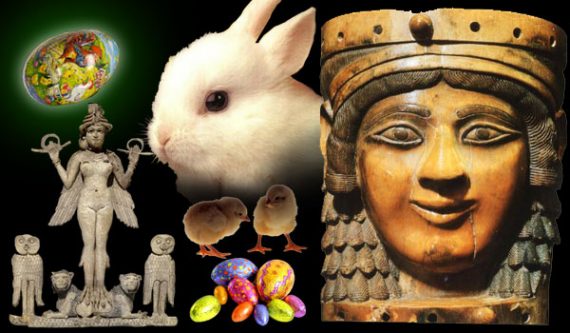
And how about driving a Mazda:
- The Mazda car is named after the chief Persian deity, Ahura Mazda. Even the early symbol of the Mazda line of cars (1936-1962) resembled the dual-winged image of Ahura Mazda and can still be seen in the modern winged “M” logo of the Mazda (see the three images below).
- Therefore, driving a Mazda is a tribute to Ahura Mazda, the pagan Persian deity, and is sinful for Christians. The same thing can be said, by the way, about driving a Saturn or a Mercury.
Following the Christmas logic, we also cannot use a calendar:
- All the days of the week are named after pagan deities.
- Sunday = Sun’s Day
- Monday = Moon’s Day
- Tuesday = Tyr’s Day
- Wednesday = Woden’s Day
- Thursday = Thor’s Day
- Friday = Frey’s Day
- Saturday = Saturn’s Day
And most of the months of the year are also named after various pagan deities.
- January = Janus’s month
- February = month of Februa (pagan purification)
- March = Mars’ month
- April = Aphrodite’s month
- May = Maia’s month
- June = Juno’s month
- July = Julius Caesar’s month
- August = Augustus Caesar’s month
- September = the seventh month*
- October = the eighth month*
- November = the ninth month*
- December = the tenth month*
- Therefore, to talk about the days of the week or the months of the year is to give honor to the false gods and deities after which they are named.
As long as we are at it, we should also stop wearing Nike clothes and shoes, eating Mars bars, using Venus razors, buying Hermes handbags, or investing in Janus funds. And since all the planets are named after pagan Roman deities, we shouldn’t talk about our study our solar system. We also shouldn’t visit the Statue of Liberty. And no matter what, we should definitely stay away from the Washington monument and churches with steeples since they are symbols that come from pagan rituals that celebrated the male phallic.
Do you see where all this is going? As soon as Christians start to try to avoid and condemn anything and everything that has pagan roots or symbolism, we end up having to just sit at home twiddling our thumbs. Of course, even that is fraught with danger, because as Paul himself writes, every single human being has a background that is filled with paganism (cf. 1 Cor 6:9-11). So we cannot even be around ourselves!
Yes, this has now crossed over into the realm of the absurd.
But that is exactly the point.
All these condemnations of various aspects of life because those areas of life have pagan origins are nothing but absurd.
They also deny and reject the absolute fact that our God is a redeeming God. That Jesus Christ is a redeemer. That everything in heaven and on earth has been placed under the feet of Jesus so that He is all in all. That everything can be received with joy and thanksgiving in the name of Jesus. That everything is “Yes” and “Amen” through Jesus Christ, the Lord of all.
So this Christmas season, go put up lights on your tree. Go bake cookies and pass out presents. Go drive your Mazda to your job on Monday while you wear your Nike shoes and snack on a Mars bar. And while do you do all these pagan things, give praise to Jesus because He has redeemed everything, including you and me.
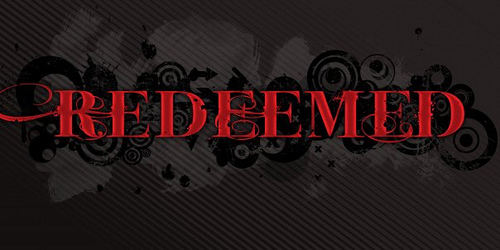
So go ahead! Cut down the tree, decorate it with silver tinsel and gold ornaments, bake the cookies, hand out presents, sing the carols, and do it all with praise to Jesus Christ, who is our Redeemer!
If you want to read more about this, I have written a short eBook on the subject, titled Christmas Redemption. Get your copy on Amazon today for $2.99.
Better yet, “Hope” and “Love” Members of RedeemingGod.com will get this book for free a few weeks after signing up. Join now.







 He pulled out his Bible and turned to Jeremiah 10:3-4 and had me read it. It says this:
He pulled out his Bible and turned to Jeremiah 10:3-4 and had me read it. It says this: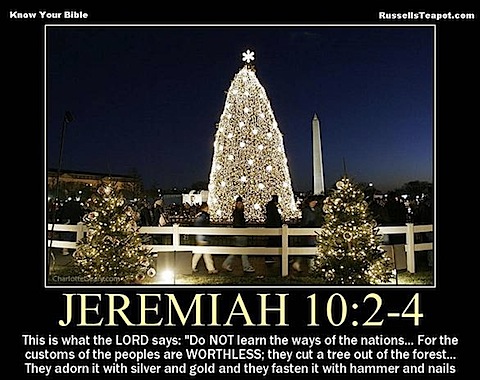

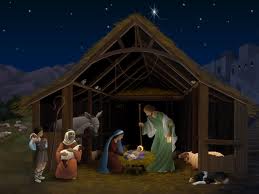 As a child I often remember running outside to play, leaving the door wide open behind me, only to have my mother call after me, “Come back and shut the door! You weren’t born in a barn!”
As a child I often remember running outside to play, leaving the door wide open behind me, only to have my mother call after me, “Come back and shut the door! You weren’t born in a barn!”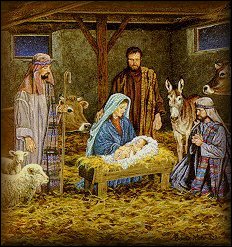
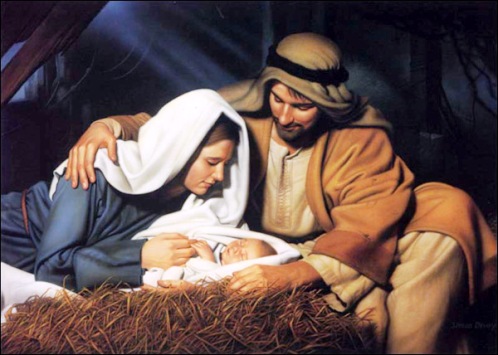

 So someone left a one-star review of
So someone left a one-star review of  This does not mean that Genesis 1-2 is myth, or that God didn’t really say the things He said in Deuteronomy, or that the Jewish feasts have no significance or meaning.
This does not mean that Genesis 1-2 is myth, or that God didn’t really say the things He said in Deuteronomy, or that the Jewish feasts have no significance or meaning.

